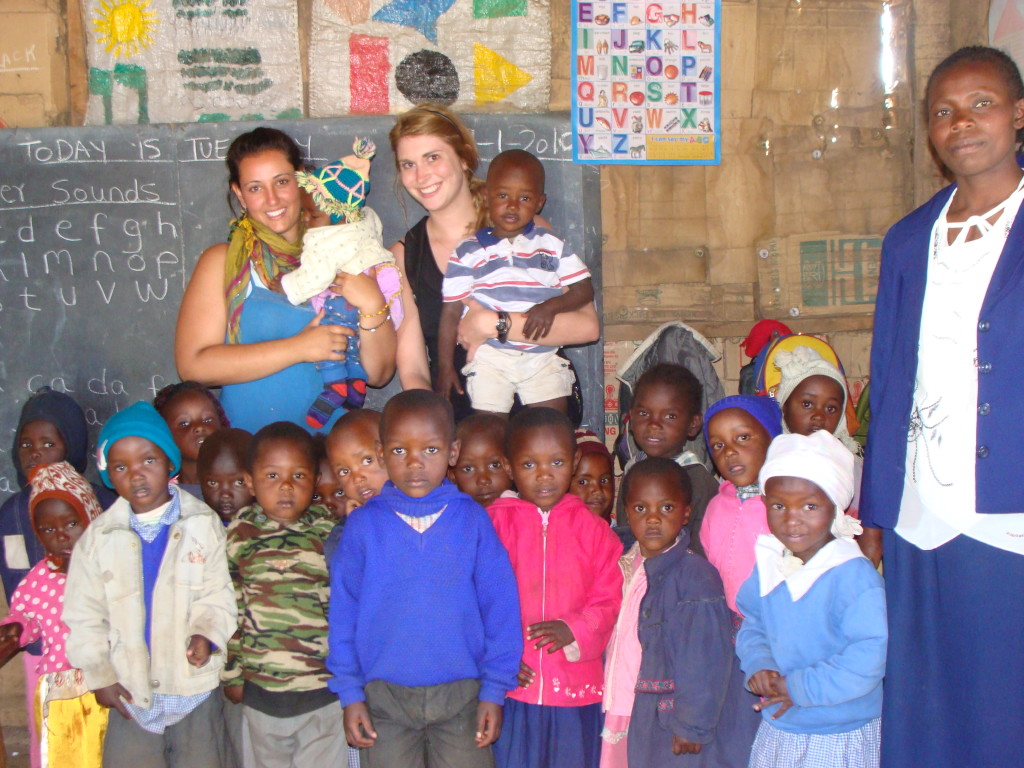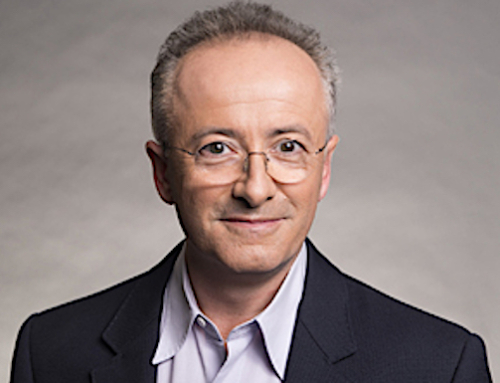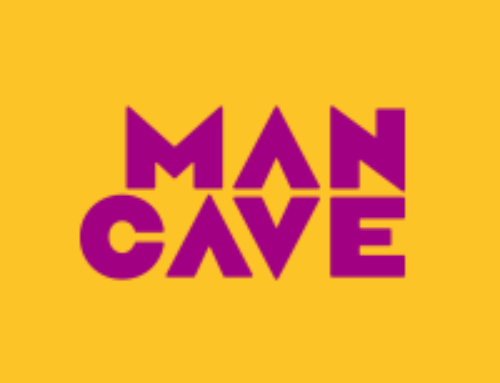A Nambian girl is pictured collecting water from a river for her family. A maternal voiceover says ‘Change a life – sponsor a child now’, and the girl’s face turns to the camera and breaks into a radiant smile.
Genna Radnan remembers being deeply affected by these World Vision and Oxfam sponsorship advertisements, often on high rotation around Christmas:
“People don’t get a choice which family they’re born into, so I couldn’t reconcile why I had been so lucky and they hadn’t – that could have been me.”
Genna’s passion for Africa was heightened by her legal studies teacher’s stories about his experiences living in Namibia. Mr David Whitcombe also taught her about the role of the United Nations and the importance of human rights.
Leaving school in 2009, Genna visited a travel agent with the goal of volunteering in Africa. She was sent on a six-week journey helping to build infrastructure and teaching students in Kenya. Travelling to Karunga, she visited the local kindergarten and was shocked to find it was built from cardboard and wood, with uneven floors and no windows. Genna’s volunteer group were laying bricks for the primary school next to the kindergarten, yet were not permitted to rebuild the kindergarten because it was under different management. According to local builders, renovating the kindergarten was estimated to cost $2,500. Genna describes herself as: ‘a very curious person who will continue to try to solve a problem until I get to the bottom of it’. Indeed after contacting family and friends back in Australia to ask for financial assistance, she was able to raise $15,000 for the refurbishment of the kindergarten:
“I was able to build them an entire new classroom, change the location, put in some glass windows, attach a teacher’s office, install new toilets, build a fence, some swings and a water tank, and purchase new desks and chairs.”
The success of this venture set Genna’s life on a new trajectory, which resulted in the establishment of the non-for-profit Gennarosity Abroad. The organisation has been classified as an Australian Charity since September 2013, and is founded on the Millennium Development Goals of the United Nations, particularly that which relates to the ‘promotion of gender equality and empowerment of women’.
During her second visit to Kenya in 2010, Genna met mother of eight Zipporah and her husband Jack. Zipporah was illiterate and uneducated, and Jack worked as a labourer on a casual basis, earning a single dollar a day to feed a family of ten; the two eldest children were sent to make an income on the local farm. Genna began supporting the family with food, furniture and blankets to keep them warm in the cold of the high altitude. Six weeks after the conclusion of the volunteer progam, Genna heard through community members that Jack had sold all of her gifts to feed his alcohol addiction. Soon after, he was killed unexpectedly, leaving the uneducated Zipporah to care for eight children. Genna continues to support the family and credits Zipporah as the inspiration behind the development of Grandma Jenny’s Training Centre.
“Education is the key to breaking poverty; if you’re educating women, you’re educating a family, and community, and that has a flow-on effect.When people aren’t educated they’re not empowered. “
Grandma Jenna’s Training Centre, named after Genna’s grandma, was established in 2013 to provide free education to females over 12 years of age:
“I wanted to try and break that poverty cycle and teach them skills so that they can then send their children to school.”
Genna was invited to present her idea for the training centre in front of the United Nations in Singapore. From the presentation, the centre was given funds to buy a 50,000L water tank which contributes to irrigation, hygienic sanitation and building maintenance, and it provides clean water to medical centres. Grandma Jenny’s recognises the value of teaching women about family planning and contraception (“less children often equates to less poverty, as parents are better able to financially support their family”). The centre takes a holistic approach to education (“there is no point teaching a woman how to tailor if they don’t know how to measure or do maths.”), and the curriculum covers English and Swahili language, maths, health education, financial literacy, business studies and tailoring. The aim of the school is to ensure everyone has access to quality education and clean water, reduce the incidence of HIV and malaria, improve maternal health, protect children and provide access to counsellors.
“I travel to Kenya annually to attend the Graduation Ceremony of forty women, which is held in December. Donations are currently being used to sustain the training centre, paying for teacher salaries.”
The school makes a small income from the sale of school uniforms, made by the students themselves.

An alumnus of Grandma Jenny’s Training Centre is Rose Kaburu, the current business manager of Gennarosity Abroad:
“I met Rose in 2009 when I was volunteering. She was one of the women being paid to help look after volunteers; I kept in touch with her and I always live with her when I visit Kenya. She is one of nine children and she was the first person in her family to go to university and graduate. I paid for her third year of university, her now-husband paid for her second year and her uncle paid for her first year. Rose comes from a village where I do my projects so I like to show to the people at my training centre and say ‘You can be just like Rose’. Her family used to be so poor they would pick weeds by the side of the road to boil them and eat them. Rose was one of my first students, she has since graduated, being qualified to do whatever tailoring job she could find, and is now able to feed her kids and send them to school.”
Gennarosity Abroad is a voluntary organisation which only gained Deductible Gift Recipient status in November 2015, (“When people would donate, it was all on good will”). To earn a living, Genna works full-time as a school nurse. It is not surprising, therefore that the charity’s third project is the development of the Toto Tania Family Medical Clinic, which will meet the huge demand for medical care, assistance and accessibility in Kenya.
Poverty is often viewed as an insurmountable global issue; a problem Genna approaches with her practical mindset:
“You can’t change the world, but you can change the world of somebody’s life. It’s all relative, and to scale. It can be overwhelming but you’ve got to break it down into small achievable goals that you can tackle as individuals or communities.”
The International Aid and Development student explains that there are multiple interlinked causes of poverty:
“Weather conditions and climate change contribute to poverty as in drought season there is often no water to feed livestock or water crops, so people and animals starve, and the prices of available food increases.”
Issues like poverty and climate change are universal, yet there is still no binding document for all governments to follow:
“They either need regional support or the different governments to come together to implement policies, rather than having different strategies.”
The current Kenyan Government is very corrupt:
In the case of climate change, which is admittedly mostly caused by rich countries, the poorer countries don’t have the resources or funds to build infrastructure to battle these issues. Additionally, corrupt governments ensure that the allocated money is not going to be put towards helping, Under these administrations, a culture is breeding where if citizens speak out, they are assassinated.”
Such corruption is certainly not subtle:
“A lot of countries who donate international aid know that the governments are corrupt, but they are ticking a box.”
The key to implementing successful community programs is to design projects based on the needs of the people, not based on what others think they should have:
“People come in wanting to act quickly and they can actually cause harm; you’ve got to get to know the people you are wanting to help and make sure you have their participation and their input and their ownership. Don’t push your values and morals, beliefs and religion onto other people. “
For those not in a position to work on the ‘front line’ by volunteering, Genna has some practical advice on how we can contribute to the reduction of poverty:
“Support smaller charities, they don’t have as many people involved in the decision-making hierarchy, so your dollar goes further and has more impact.”
Given the opportunity, Genna would meet with world leaders to understand how they perceive their country’s citizens and their justifications for ruling the country in certain ways. She would then make suggestions for change whilst being careful not to install western values.
“Ideally, I would sit down, do a proper evaluation, calculate statistics and research what is missing or failing in third-world countries, and then implement specific projects to address those.”
All of Gennarosity Abroad’s future projects will focus on sustainability:
For all projects, we need to keep in mind, social, environmental and economic factors because they are all interrelated.”
A piece of Genna’s soul now resides in Kenya:
“The country is home to the world’s best wildlife, and a lot of history has been maintained. Overall the Kenyan people are very hospitable and some of the nicest people I’ve met in my life.”
Despite also experiencing the dark underside of Kenya, when she was the victim of a carjacking and robbery, Genna found that it imbued her with an even stronger drive to make a difference.
“I felt empowered because as an outsider it gave me a much better understanding of what ordinary Kenyans go through. I am not going to judge. I am not going to live my life in fear.
To assist Genna Radnan and Gennarosity Abroad, please visit https://www.gennarosityabroad.org/








